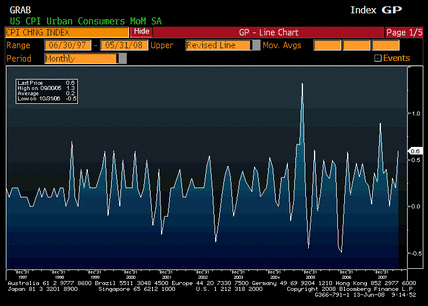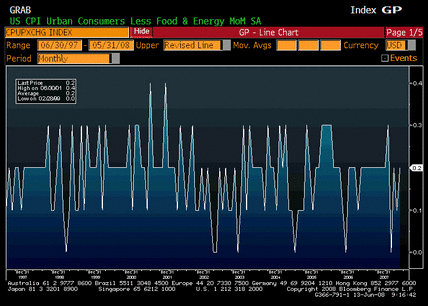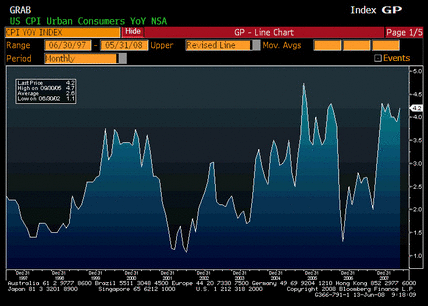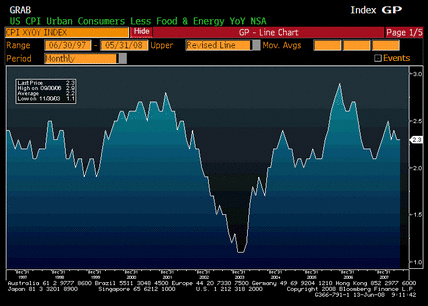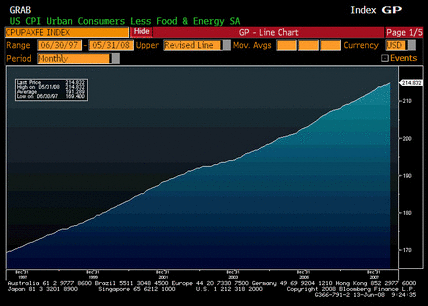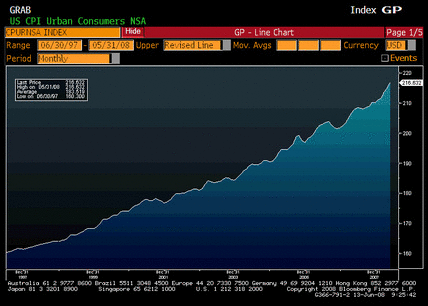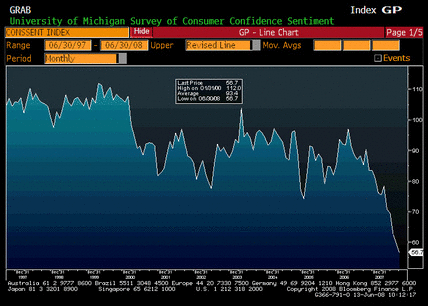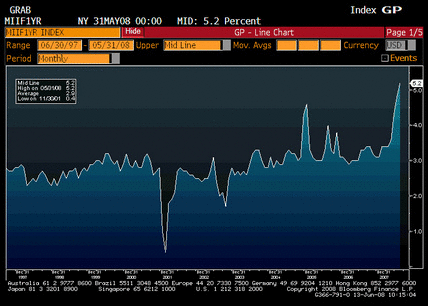- Consumer Price Index MoM (Released 8:30 EST)
- CPI Ex Food & Energy MoM (Released 8:30 EST)
- Consumer Price Index YoY (Released 8:30 EST)
- CPI Ex Food & Energy YoY (Released 8:30 EST)
- CPI Core Index SA (Released 8:30 EST)
- Consumer Price Index NSA (Released 8:30 EST)
- U of Michigan Confidence (Released 10:00 EST)
- Inflation Expectations 1yr Forward (Released 10:00 EST)
Consumer Price Index MoM (May)
| Survey | 0.5% |
| Actual | 0.6% |
| Prior | 0.2% |
| Revised | n/a |
From Karim:
More divergence between headline and core.
- Headline up .6498% m/m and 4.2% y/y; 3mth annualized rate of 4.9%
- Core up .202% and 2.3% y/y; 3mth annualized rate of 1.8%
Trends diverging
- Gas (up 5.7%) and lodging away from home (+1.3%, but just reversing prior mth’s 1.9% drop) only major outliers
- Medical (0.2%), oer (0.1%) and education (0.4%) all in line with trend
Kohn defended his inflation forecasting approach on Wednesday (based on ’50yrs’ of analysis). Basically using an ‘expectations augmented’ Philips Curve; meaning slack (which he stated is opening up) is largest determinant of inflation, as long as expectations are stable. He said if ‘over time’ expectations did not recede, it would be ‘troublesome’ for inflation; in the meantime, the Fed would ‘temporarily’ allow a rise in both inflation and joblessness. Some Regional Bank Presidents may feel differently.
CPI Ex Food & Energy MoM (May)
| Survey | 0.2% |
| Actual | 0.2% |
| Prior | 0.1% |
| Revised | n/a |
Consumer Price Index YoY (May)
| Survey | 3.9% |
| Actual | 4.2% |
| Prior | 3.9% |
| Revised | n/a |
The dip in the second half of 2006 was entirely due to the Goldman induced commodity sell off when the gasoline weighting in their index was changed.
Prices have now fully recovered and resumed their uptrend.
CPI Ex Food & Energy YoY (May)
| Survey | 2.3% |
| Actual | 2.3% |
| Prior | 2.3% |
| Revised | n/a |
Food and energy prices are just beginning to be passed through to core CPI. Everything is composed of food and energy, so it’s just a matter of time before all prices catch up, particularly with GDP now moving up some with the latest fiscal package kicking in.
Because headline CPI is a smaller percentage of GDP than it was in the 70’s, the passthrough will take a bit longer.
CPI Core Index SA (May)
| Survey | n/a |
| Actual | 214.832 |
| Prior | 214.398 |
| Revised | n/a |
Consumer Price Index NSA (May)
| Survey | 216.205 |
| Actual | 216.632 |
| Prior | 214.823 |
| Revised | n/a |
U of Michigan Confidence (Jun P)
| Survey | 59.0 |
| Actual | 56.7 |
| Prior | 59.8 |
| Revised | n/a |
Below expectations, but seems inflation is cutting into confidence, so this doesn’t give the Fed a reason not to hike at the next meeting.
Inflation Expectations 1yr Forward (May)
| Survey | n/a |
| Actual | 5.1% |
| Prior | 5.2% |
| Revised | n/a |
This is persisting at far too high a level for Fed comfort.
[top]

